Preparing for the Future of Education
Key Points
-
Teachers often feel like they have to be the expert, but I can attest to the fact that you don’t.
-
Thinking that I had to be the expert in tech kept me from taking risks throughout my teaching career.
-
I know that I don’t have to be the expert, I only need to know enough to get students started.
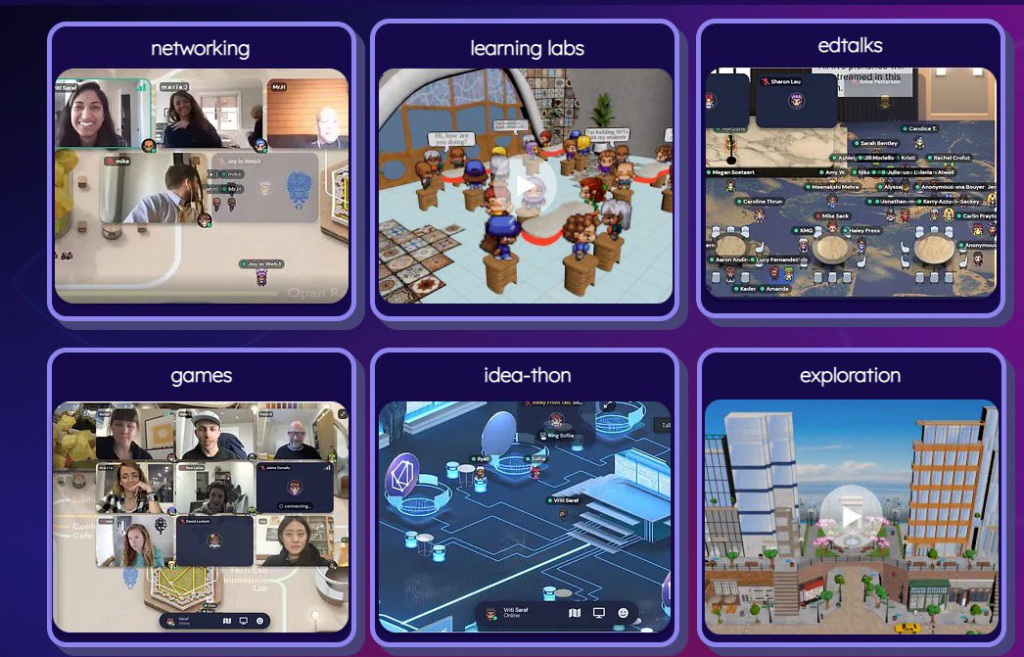
Over the last couple of years, there has been a lot of discussion about emerging technologies including artificial intelligence, augmented and virtual reality, blockchain, cryptocurrency, the metaverse, NFTS, and web 3. There are so many things happening in the world of technology impacting the workplace, and we are now starting to see these technologies making their way into the education space. For teachers, that work with elementary students, or teach a content area such as math or a specific course like calculus or physics, they may wonder how these topics might connect with the content they’re teaching. As a Spanish and STEAM teacher, for years I did not bring emerging technologies like AI or AR/VR into my Spanish classroom because I thought “I’m just a Spanish teacher.” However, we all need to help our students understand these technologies and their potential impact on our personal lives and education today and for the future. There is something that each of us can do in our classrooms regardless of the grade level or content area that we teach. It might look different for each of us, but we can still find ways to help students better understand the technologies that will be part of the future of learning and work.
How can educators prepare?
Teachers often feel like they have to be the expert, but I can attest to the fact that you don’t. Thinking that I had to be the expert kept me from taking risks throughout my teaching career. I know that I don’t have to be the expert, I only need to know enough to get students started. Then they can take the lead and we can learn with them as everyone knows, we learn directly from them too. So when it comes to these topics, finding time to learn about them can be challenging. How can we possibly know enough?
In October, Getting Smart held a Town Hall focused on “Where has education been and where will it go next?” Nate McClennen, VP of Innovation and Education kicked off the event with an overview of the different web versions. Vriti Saraf, Co-Founder of Ed3 DAO spoke about the versions of the web and how “Web3 will advance things at a technological level, this technology will also have impacts on reshaping the “ethos of the web.” Mike Peck also shared some of the themes of web3 and the impact on the learning systems in place and the roles of educators and students in this space.
To get started, educators can explore blogs available through Getting Smart, participate in the Ed3 DAO Twitter spaces and check out resources from their 3-day Ed3 conference held November 11-13, 2022. The conference’s mission was to help educators understand what these technologies mean for the future of education and how to best prepare students.
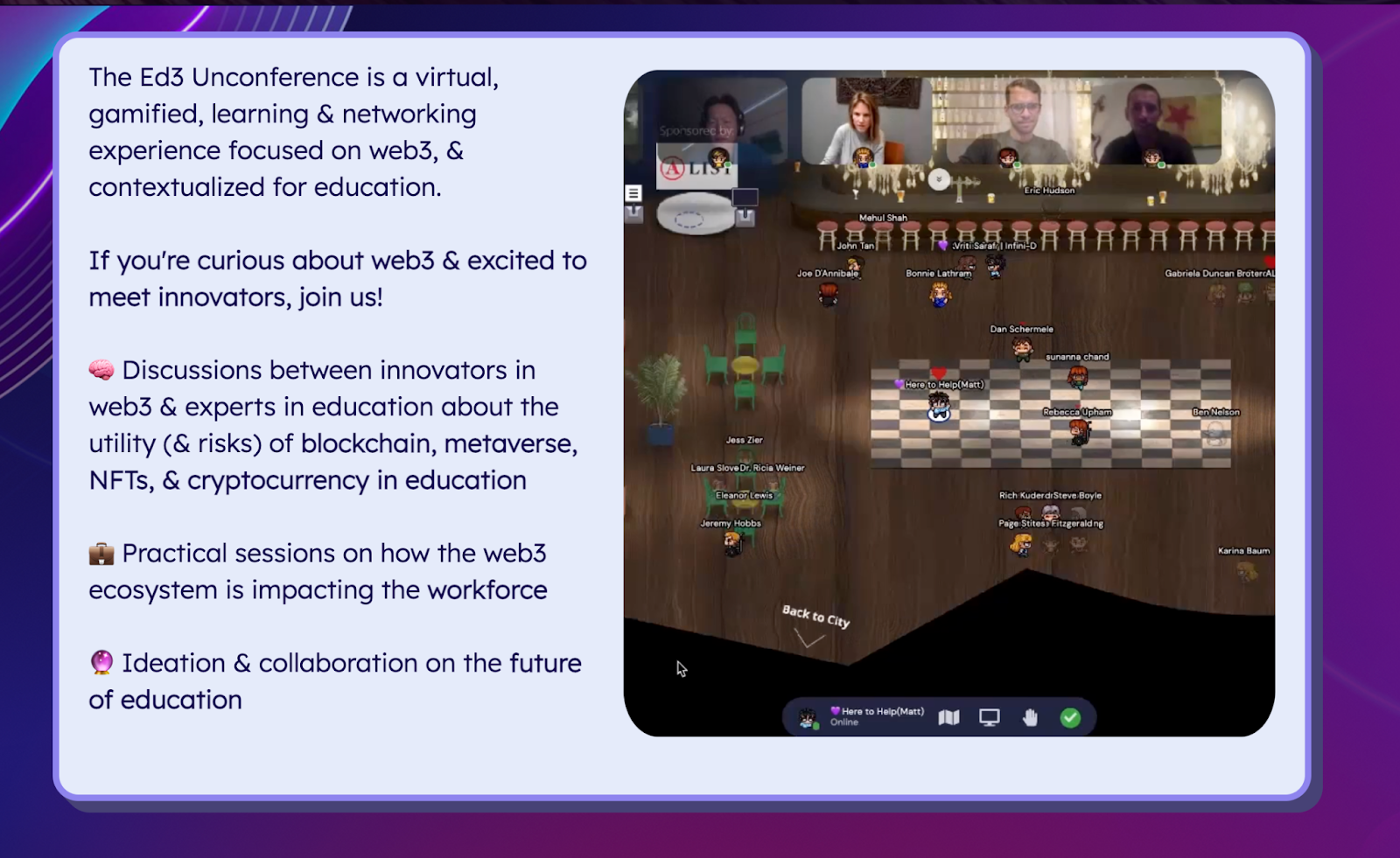
What is Ed3 DAO?
Ed3 DAO (Digital Autonomous Organization), co-founded by Vriti Saraf and Mike Peck is a group created “by educators and for educators” to learn about web3. They are “committed to onboarding one million educators into the world of web3.” Educators can join the group and interact through a Discord Channel or connect via Twitter. Ed3 DAO recently held its first virtual conference in the Edverse. It had a variety of session types including Ed talks, hackathons, gaming, networking opportunities, learning labs, and more. The focus was on the future of “learning, earning, teaching and community.” There were “discussions between innovators in web3 & experts in education about the utility (& risks) of blockchain, metaverse, NFTs, & cryptocurrency in education.”
For anyone new to these concepts, the conference provided opportunities to explore and interact in the metaverse space. The design of the conference helped educators understand how to build an immersive and collaborative learning experience for students. The event included a variety of learning opportunities including Edtalks, 20 learning labs, networking and idea labs in the Edverse where you could pitch ideas and get feedback from other attendees. There were also 12 Mastermind sessions focused on topics such as AI and the future of writing, what students need to learn about web3, amplifying SDGs with web3, and legal topics in the metaverse.
Attendees were able to receive a “proof of attendance protocol” (POAP, an NFT) certificate on blockchain as evidence of their participation in the event after each day. The proof can then be used for professional development hours, shared on social media, added to a crypto wallet, or used for teacher professional development hours.
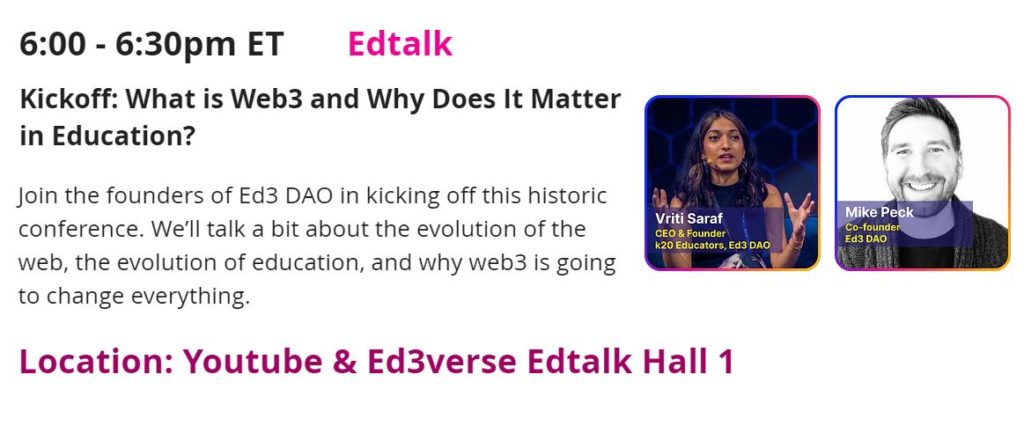
Some of the main speakers included Vriti Saraf, Mike Peck, Dagan Berstein, leaders in this space and I recommend that anyone wanting to learn more and be involved, should follow their work. During this event, participants were able to learn about what web3 means and how the look and feel of school might change. It was a great opportunity to connect with educators who are teaching students about these topics and gather ideas for use in the classroom. Also to be able to experience the metaverse by joining in the virtual space, selecting an avatar, and learning how to communicate in these new spaces for learning. There were opportunities to explore games like choose your own adventure and win an Ed3 NFT and see some of the other projects that have been created in the web3 in the Project Expo.
The event
The kickoff “What is Web3 and Why Does It Matter in Education?” What is Ed3 DAO and how to make the most of the conference with Vriti Saraf and Mike Peck. They spoke about what web3 is, how it has evolved and the impact that it will have on education and the world. Vriti explained how when the world wide web was created in 1990, at first it was decentralized and open source, which meant anyone could create. Web 1.0 was “read” and there were not a lot of opportunities to do more than consume content. In 2005, the web evolved to become web2.0, where social media apps and other websites could be created by people without the need to know how to code. It made global collaboration and sharing of content possible. This was the “Write” version because we could now contribute. Web 2,0 changed from “building to business, collaboration to monopoly and innovation to profit generation.” Tim said “this is not the web we wanted to create.” This is where web3 comes in and the focus of the conference. Web 3.0 is “own” because people can own and create their own info because of blockchain. It has shifted from closed to open, business to building, and monopolies to collaboration. No longer tied to owning everything but instead, sharing.
Vriti said, “As educators, the small scale building mentality is leading to creating micro-schools and unbundled learning. Collaboration and community-driven equals personalization. Innovation is leading to new ways of learning, hybrid, immersive and regenerative.”
Mike Peck spoke about the shifts from web versions and their impact. Now we have the gig economy and people can engage in different types of work. In web3, more changes are coming. As the web evolves, we may see the “creator economy.” How will decentralized platforms enable people to create and explore in ways unlike what we can do now?
How will it impact our daily lives? Instagram, Starbucks, and Pearson are a few corporations that are discussing how web3 will impact strategy and are looking at the use of NFTs. As the web evolves, educators need to help students develop essential skills such as digital citizenship, financial literacy, and the 4 Cs. In web3, “there is an importance of community and how we can work together to achieve great things.” According to Mike, “Our students are already experiencing the metaverse, like with Fortnite and some are even investing in web3. A 12-year-old created a collection called “Weird Whales” and made around $160,000 in one day. He created the code base through to the NFT collection.
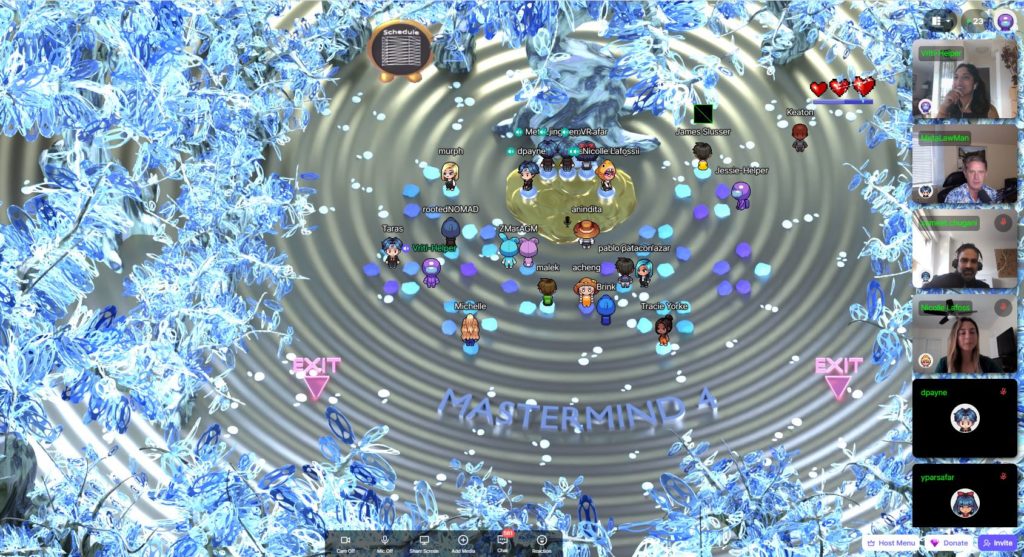
The unconference experience
Attendees could experience an unconference and suggest topics for discussion or just join in some of the sessions. Topics such as Bitcoin 101 and hashing, the process of and time requirements for mining, and governance of assets were a few. I enjoyed a session about how a teacher decentralized their classroom through a DAO-like structure. They launched a community token and microeconomy with their fourth graders, which shows that we can teach students of all grade levels about the metaverse and these emerging technologies. Other sessions such as Gamifying Immersive Social Learning Experiences with Pablo Ortiz from Erasmus, Digital Badges and Microcredentials, NFTs, Web3 and Social impact projects were popular topics.
It was unlike any other experience I have had. The gatherings around the learning labs during the unconference and being able to interact, engage in live conversations whether the camera was on or off, and moving in all of those spaces was awesome. It offered flexibility by being able to move your avatar into any of the different learning spaces and quickly enter another space to connect with attendees. While it is similar to being at an in-person event or a virtual conference and changing sessions, the time to move and enter the spaces is in your control and instant when in the Edverse, rather than waiting for someone to let you into the room or traveling a distance.
On Sunday, Nate McClennen, VP of Education and Innovation of Getting Smart kicked off Day 3 events with an Edtalk about “How can web3 drive open ecosystem of learning, workplace degrees, and thriving democracies and livelihood? He spoke of the evolution of the web and how web 3 allows for “permissionless, self-sovereign and decentralized systems, which increases access and agency which empowers people to be more active.” With centralized systems, there are groups of data that are being used to make money for others, compared with decentralized. When it comes to learning, the learners control credentials, and digital wallet/employment records. Store information there, the diplomas are there and are easily verifiable without other distractions or time consumption.
Joining the different Edtalks held in the learning labs or available on YouTube was such a unique experience. There were so many great sessions available that deciding was difficult!. Some of the topics for learning labs that I joined were Design, Modeling, and Building NFTs to Build Future Student Entrepreneurs, and Making Web3 Work for Workforce Education with Dr. Micah Shipee and Kaylee Brown.
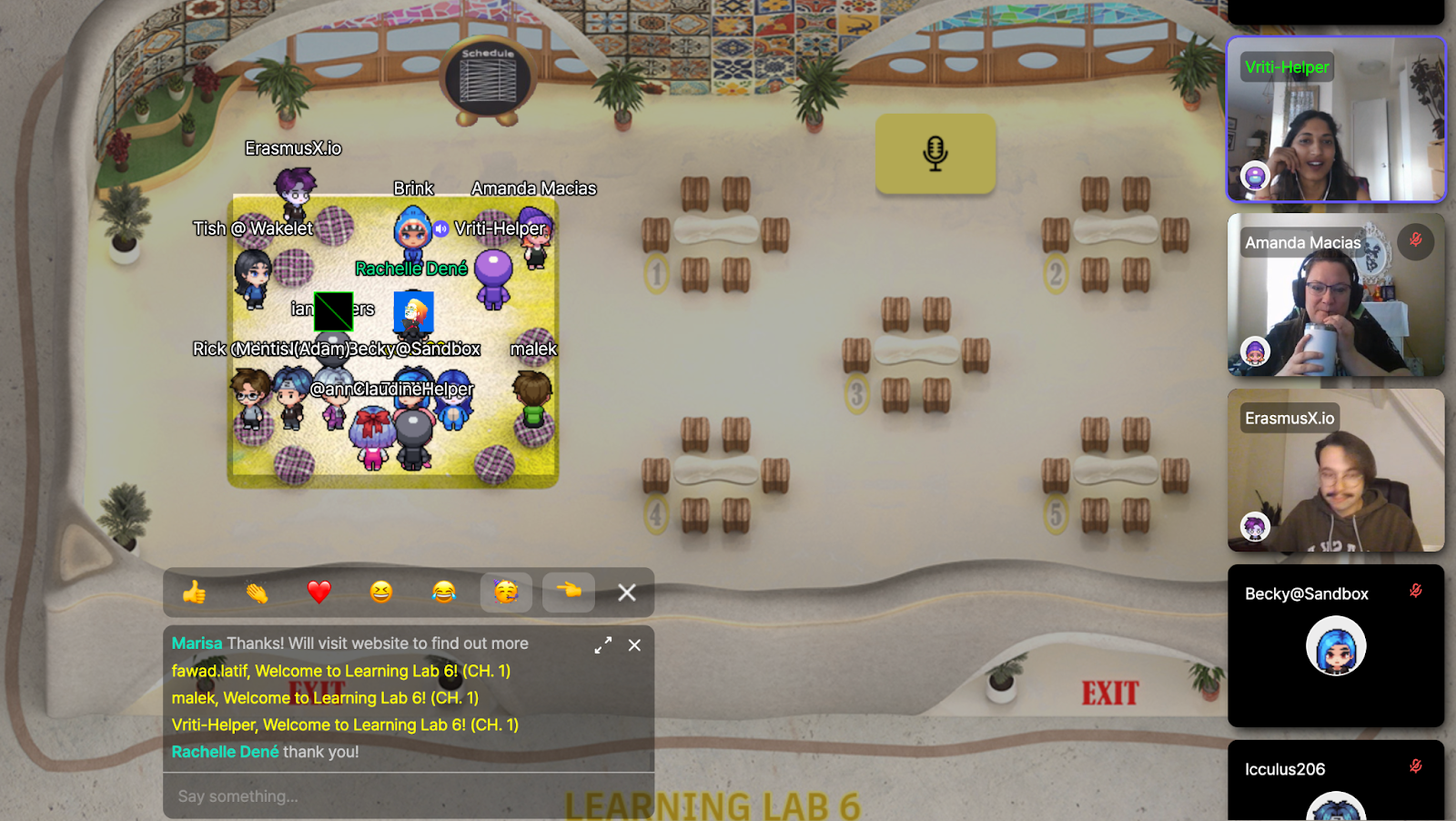
The conference ended with a dance party in the virtual space celebrating the conference and thanking Vriti Saraf for an amazing event. Several members of the planning team spoke and shared some of the key takeaways from the event. Vriti said, “Web3 is all around us and it is here and education is always the last to catch up.” She thanked everyone for joining in the event, and the management of it, which was planned for 6 months.
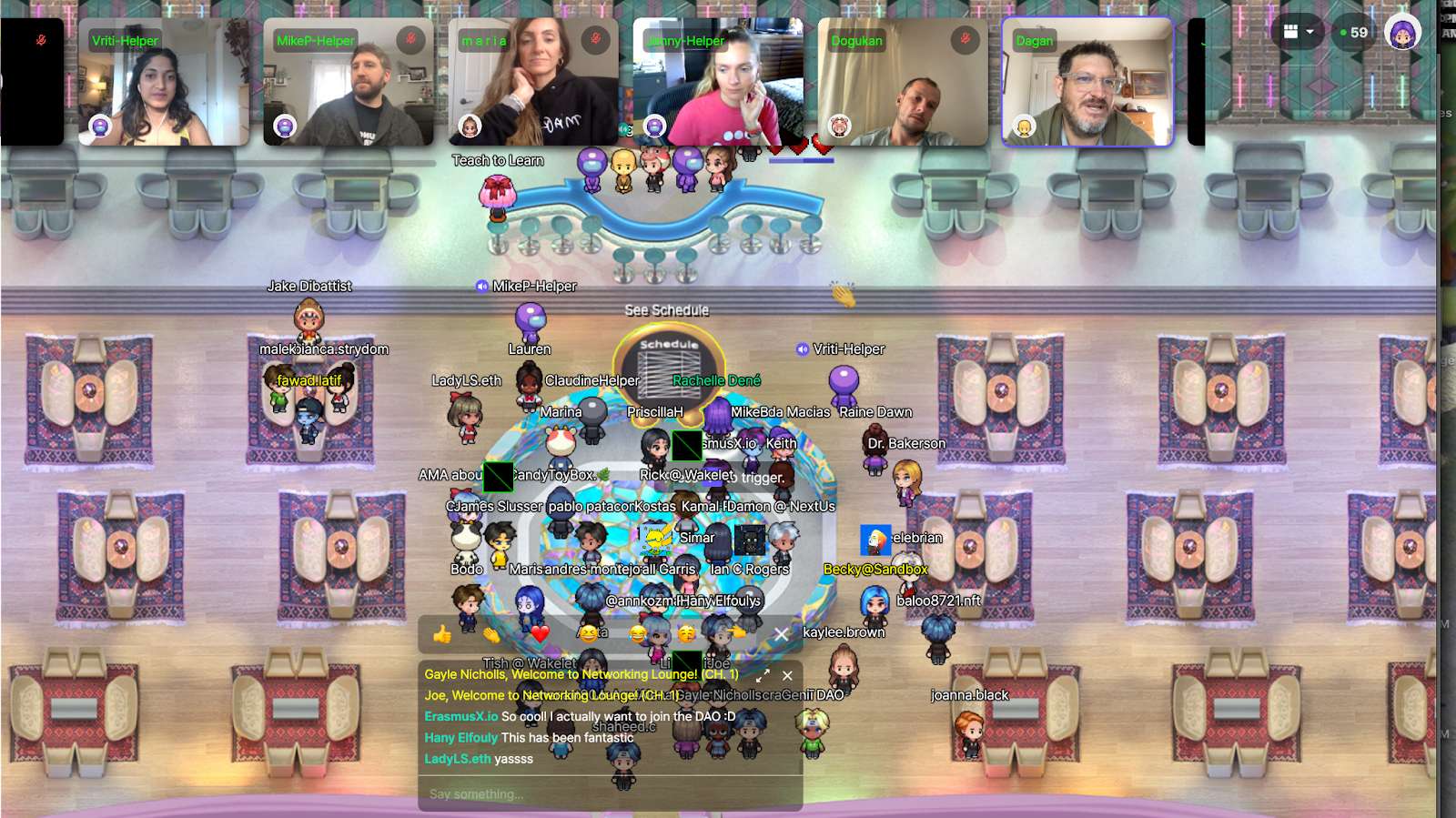
To learn more, check out the Twitter feed for the #Ed3con22 event to see more images, the conversation topics and connect with other educators. I recommend that anyone interested in learning more about web 3, become a member and check out the events that the Ed3 DAO holds each month. There are also courses available for educators to work through that are focused on the blockchain, metaverse, NFTs, web3, and more.
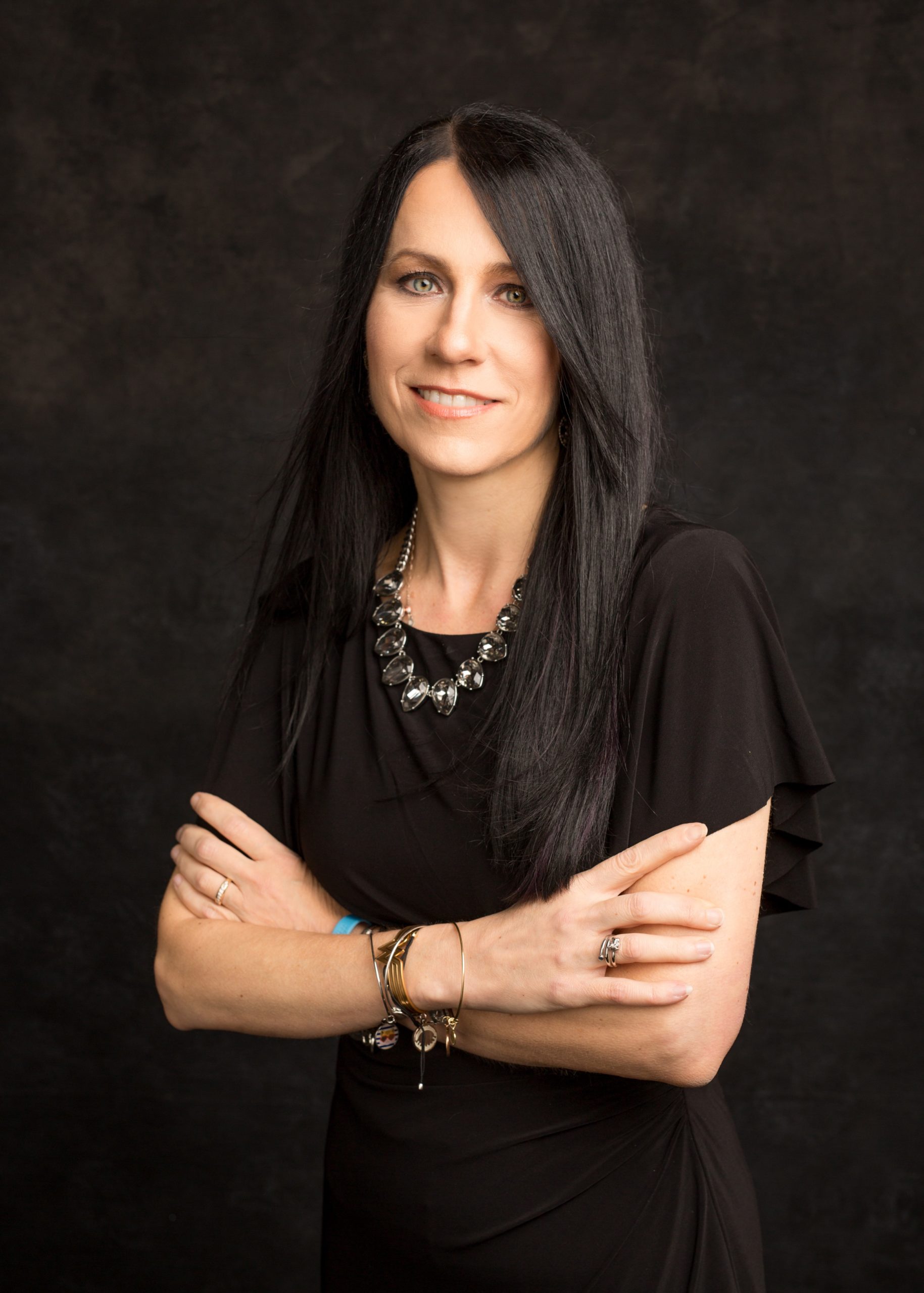



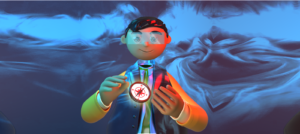

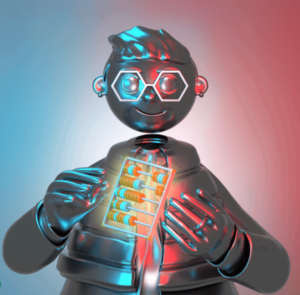
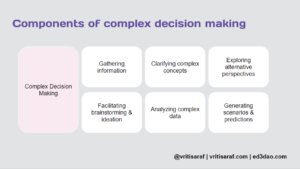
0 Comments
Leave a Comment
Your email address will not be published. All fields are required.